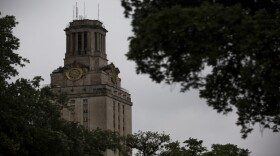When Amanda Bosky, a graduate student in sociology, goes to an academic conference, she often uses Airbnb to save money. Now the University of Texas at Austin student is worried that she can't anymore.
UT-Austin employees, including professors and graduate students, received notice Tuesday that they can’t use state money to stay in Airbnbs. The message comes just weeks after Texas blacklisted Airbnb for its alleged boycotting of Israel after the company removed its listings in the West Bank. Airbnb says it does not boycott Israel.
"Any future reservations will need to be cancelled and reservations will need to be made with another lodging establishment," said an email one UT department sent to students.
Airbnb was blacklisted because of a 2017 law, House Bill 89, which says state agencies cannot contract with companies that boycott Israel.
"The state of Texas prohibits agencies from doing business with companies that boycott Israel, as designated by the comptroller. The University of Texas at Austin follows that law," UT-Austin President Greg Fenves said in a statement. "Economic boycotts that target Israel unfairly single out one nation and shut down the free exchange of ideas that we value at UT."
The decision may affect how students and professors can spend money to conduct fieldwork or attend academic conferences, which can cost hundreds of dollars or more.
“As grad students, we do use Airbnb a lot for attending conferences because we don’t have a lot of money. Because the hotels are so expensive, we usually use Airbnb,” said Bosky.
Bosky typically receives $600 to $800 from her school to cover all costs of attending a conference — including airfare, ground travel, lodging, food and conference fees.
Airbnbs have been a way to save money — and not just for lodging. In a hotel, she would have to eat out at restaurants, but she can cook for herself in an Airbnb.
"I feel like this affects the grad students more than anyone else because we’re the ones who have to stretch our money when we attend conferences,” Bosky said.
Professors often also must be thrifty about how they spend their conference funding, especially lecturers, adjunct faculty and junior faculty, according to one UT-Austin English professor.
“It’s important [to be] able to make whatever funds you have available go as far as you can, especially in an academic market that’s quite constricted,” said Snehal Shingavi.
Airbnb announced in November that it would remove 200 listings in Israeli settlements in the West Bank. To make this decision, the company weighed potential safety risks for hosts and guests, whether the listings contribute to “existing human suffering” and whether the listings have a “direct connection the larger dispute in the region.”
While Israeli Tourism Minister Yariv Levin called Airbnb’s move “the most wretched of wretched capitulations to the boycott efforts,” according to Reuters, Airbnb has repeatedly affirmed that the company is not boycotting Israel and does not support the BDS movement, a Palestinian-led movement to boycott Israel.
Outside of the UT system, other state employees are also prohibited from using Airbnb. However, according to an online database that tracks state spending, no state agency has made a payment to Airbnb in at least the last decade.







